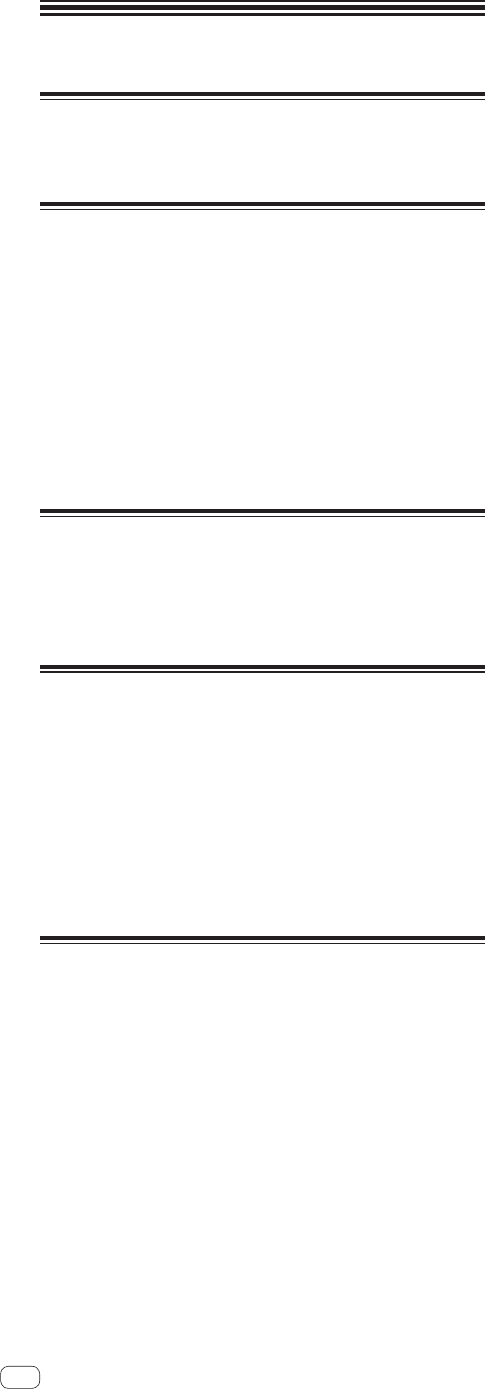
Additional information
Changing the settings
! For detailed instructions on changing this unit’s settings, see
Changing the settings in the Operating Instructions.
Troubleshooting
! Incorrect operation is often mistaken for trouble or malfunction. If
you think that there is something wrong with this component, check
the items in the “Troubleshooting” section of this unit’s operating
instructions and the [FAQ] for the [DDJ-SZ] on the Pioneer DJ sup-
port site.
Sometimes the problem may lie in another component. Inspect the
other components and electrical appliances being used. If the prob-
lem cannot be rectified, ask your nearest Pioneer authorized service
center or your dealer to carry out repair work.
! This unit may not operate properly due to static electricity or other
external influences. In this case, proper operation may be restored by
turning the power off, waiting 1 minute, then turning the power back
on.
About trademarks and registered
trademarks
! Pioneer is a registered trademark of PIONEER CORPORATION.
The names of companies and products mentioned herein are the trade-
marks of their respective owners.
Cautions on copyrights
Recordings you have made are for your personal enjoyment and accord-
ing to copyright laws may not be used without the consent of the copy-
right holder.
! Music recorded from CDs, etc., is protected by the copyright laws of
individual countries and by international treaties. It is the full respon-
sibility of the person who has recorded the music to ensure that it is
used legally.
! When handling music downloaded from the Internet, etc., it is the
full responsibility of the person who has downloaded the music to
ensure that it is used in accordance with the contract concluded
with the download site.
Specifications
Power requirements ....................................AC 110 V to 240 V, 50 Hz/60 Hz
Power consumption ...............................................................................30 W
Power consumption (standby) .............................................................0.4 W
Main unit weight ...................................................................10.4 kg (22.9 lb)
Max. dimensions ................... 870 mm (W) × 98.4 mm (H) × 419.5 mm (D)
(34.3 in. (W) × 3.9 in. (H) × 16.5 in. (D))
Tolerable operating temperature .........+5 °C to +35 °C (+41 °F to +95 °F)
Tolerable operating humidity ......................5 % to 85 % (no condensation)
Audio Section
Sampling rate ....................................................................................44.1 kHz
A/D, D/A converter ............................................................................... 24 bits
Frequency characteristic
USB, CD/LINE, MIC1, MIC2 ............................................20 Hz to 20 kHz
S/N ratio (rated output, A-WEIGHTED)
USB ................................................................................................111 dB
CD/LINE ...........................................................................................97 dB
PHONO ............................................................................................90 dB
MIC1 ................................................................................................84 dB
MIC2 ................................................................................................84 dB
Total harmonic distortion (20 Hz — 20 kHzBW)
USB ...............................................................................................0.002 %
CD/LINE ........................................................................................ 0.004 %
Standard input level / Input impedance
CD/LINE ............................................................................–12 dBu/47 kW
PHONO .............................................................................–52 dBu/47 kW
MIC1 ................................................................................–52 dBu/8.5 kW
MIC2 ................................................................................–52 dBu/8.5 kW
Standard output level / Load impedance / Output impedance
MASTER OUT 1 ......................................... +6 dBu/10 kW/390 W or less
MASTER OUT 2 ......................................... +2 dBu/10 kW/820 W or less
BOOTH .......................................................+6 dBu/10 kW/390 W or less
PHONES .........................................................+8 dBu/32 W/10 W or less
Rated output level / Load impedance
MASTER OUT 1 ................................................................. 24 dBu/10 kW
MASTER OUT 2 ................................................................. 20 dBu/10 kW
Crosstalk
CD/LINE ...........................................................................................82 dB
Channel equalizer characteristic
HI ......................................................................–∞dBto+6dB(13kHz)
MID .................................................................... –∞dBto+6dB(1kHz)
LOW ...................................................................–∞dBto+6dB(70Hz)
Microphone equalizer characteristic
HI ...................................................................–12 dB to +12 dB (10 kHz)
LOW ..............................................................–12 dB to +12 dB (100 Hz)
Input / Output terminals
CD/LINE Input terminals
RCA pin jacks ..................................................................................4 sets
PHONO/LINE input terminals
RCA pin jacks ..................................................................................2 sets
MIC1 terminal
XLR connector/phone jack (Ø 6.3 mm) ...........................................1 set
MIC2 terminal
Phone jack (Ø 6.3 mm) ..................................................................... 1 set
MASTER OUT 1 output terminal
XLR connector...................................................................................1 set
MASTER OUT 2 output terminal
RCA pin jacks ....................................................................................1 set
BOOTH output terminal
Phone jack (Ø 6.3 mm) ..................................................................... 1 set
PHONES output terminal
Stereo phone jack (Ø 6.3 mm) .........................................................1 set
Stereo mini phone jack (Ø 3.5 mm) ................................................. 1 set
USB terminals
B type ...............................................................................................2 sets
— Be sure to use the [MASTER OUT 1] terminals only for a bal-
anced output. Connection with an unbalanced input (such
as RCA) using an XLR to RCA converter cable (or converter
adapter), etc., may lower the sound quality and/or result in noise.
For connection with an unbalanced input (such as RCA), use the
[MASTER OUT 2] terminals.
— The specifications and design of this product are subject to
change without notice.
En
16


















